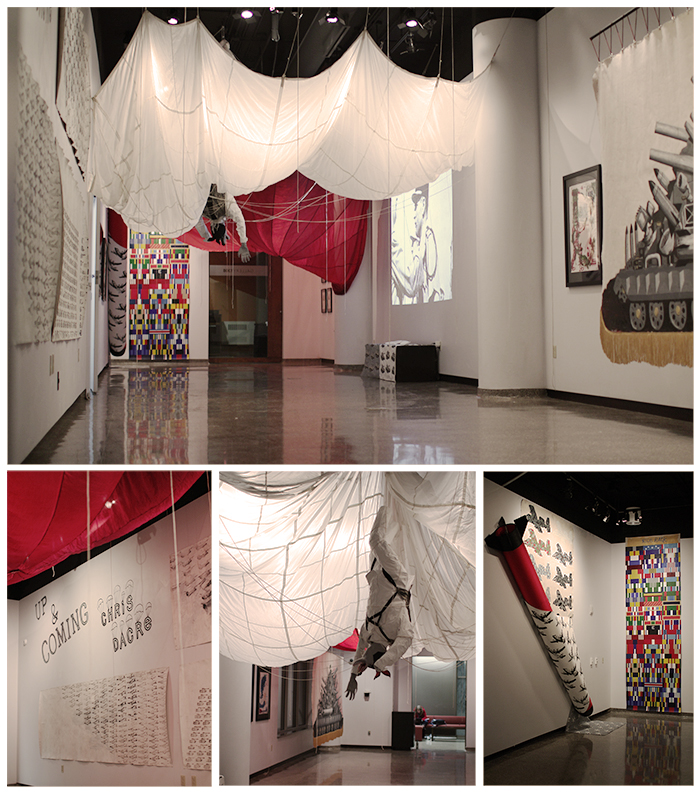Chris Dacre exhibit ‘Up & Coming’ explores war
By Brooke Appe
Combining his own experience, fascinations, and a variety of skills, Chris Dacre set out to bring new light to a truth that countless people face every day: war. With a new exhibit at Union South’s Gallery 1308, Chris’s multidimensional portrayals open up the phenomenon of war to new and unique interpretations. We spoke with him about his art, inspiration and techniques.
You definitely touch on a serious/difficult subject through a humorous and even bizarre perspective. Why do you think this is important and effective?
My artwork is a colorful, exploded, political cartoon with images that children can access and themes that adults can digest. Hopefully between the employment of these two devices, I will encourage a conversation to take place about the role the US has in the world and maybe get people to think a bit about where the minerals that run their smart phone come from or where the oil they use in your car originates. What is our real mission in Afghanistan? I’m not 100% sure. What was it in Iraq? Korea? Vietnam?
War is a really hard subject to dissect because of the many different facets that are involved. My goal is to chip away at it and try and make sense of it through making my own connections that occur through observation and investigation similar to how an investigative journalist writes about situations but instead of writings. My work is strictly visual.
You said that war has always fascinated you. After serving in the US Air Force for eight years, what are the biggest discrepancies you noticed between actually serving in the US Air Force and how it’s portrayed by media/movies/books?
I was a pretty naïve 17 year old when I went in, and there were no major conflicts going on that mass amounts of US military were needed for. When I arrived in Germany in December of 1989, the Cold War had officially ended and the re-unification of Germany took place, which was huge historically.
A few years later Desert Storm happened and the focus to the Middle East occurred. The US military shifted its sights and so that is what I experienced. A lot of times what you read about in books or see in movies depicts men at war- the excitement, glories and atrocities that centers around it, not usually the mundane, like the guy in the kitchen washing the lettuce for a couple of hundred soldiers.
What motivated you to pursue a formal art education at a university?
I knew I always wanted to go to school, but since my schedule in the Air Force was working for six days on and three days off, it didn’t allow me to attend class while I was on active duty. So when I got out and went into the reserves, I started taking general education classes at the local community college. Art didn’t happen until I was nearing the completion of my undergraduate studies at UAB (University of Alabama at Birmingham), my last two semesters involved taking some lithography classes and that set the course to study Printmaking for my MFA at the University of Arizona, in Tucson.
How do you believe your art frames the way that war fits into the US psyche as a whole?
Well I think that the US uses a lot of diplomacy and does a lot of good for the world, but in order for us to keep this economic-driven society running, we feel that we can bully our way into regions through the use of military force. As a culture we are fairly violent compared with other large countries, and I believe that some of this comes from playing war a kid: shooting, chasing and killing one another is a game often played while growing up.
When the fun wears off with that, you can switch to video games like first-person shooters. I think that this desensitizes people and makes it easier to put yourself in a position of thinking that killing might be kind of fun. The US Army has developed a ‘recruiting’ video game, “America’s Army” and it’s supposed to take someone through basic training to the battle field. Also, if you think about drone pilots, they never have to leave their seats.
It’s hard to say where we’d be as a country without the world’s largest armed forces. Maybe we’d be really good at diplomacy and learn how to share with others. Who can really tell? I’m sure there has probably been a book written on that subject.
You work with a lot of different mediums. Do you have a favorite medium to work with? Which do you find most difficult to work with?
My favorite medium is printmaking, which, I know, is a broad answer. The most challenging medium for me has been the working with stop-animation and video. I recently taught myself After Effects and so that has required many hours of tutorials.


